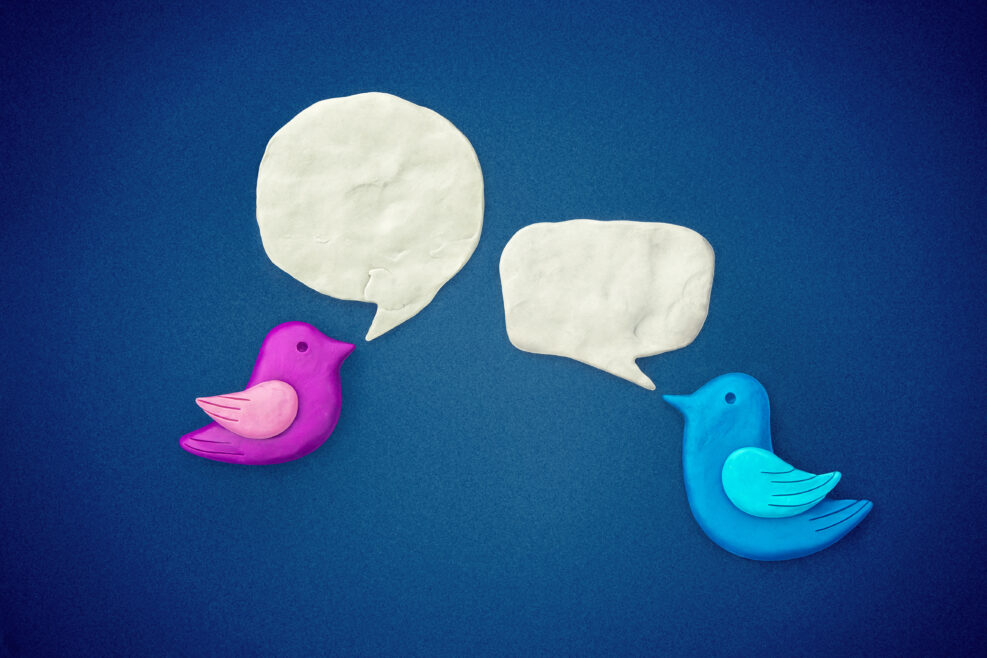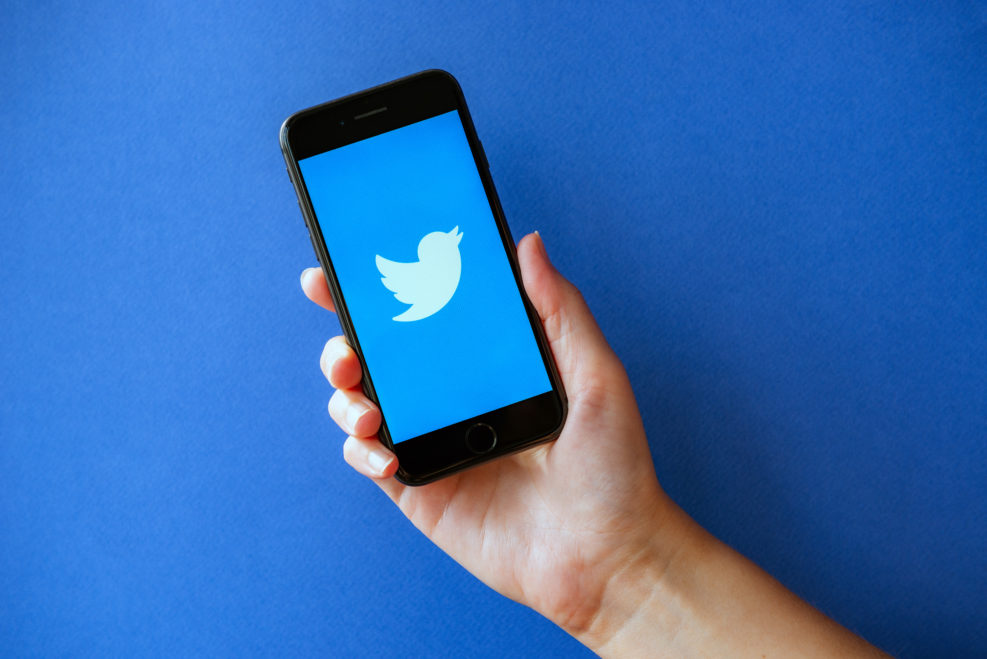
TagFree speech


The Crisis of Trust in the Mainstream Media
A vibrant and engaged media is essential to protecting American liberty. But what if it can't be trusted?This is cross-posted at Humanize. Visit this link to listen to the entire conversation between host Wesley J. Smith and journalist/commentator Alice Stewart. A vibrant and engaged media is essential to protecting American liberty—which is why the First Amendment provides such a strong protection for freedom of the press. If the media are to carry out their societal responsibilities, journalists must have the trust of news consumers. But these days, trust is in low supply. An October 2022 Gallup Poll found that only 34% of Americans trust the mass media to report the news “fully, accurately and fairly.” Why are the media experiencing this profound crisis of trust and what can be done about it? Wesley’s guest on this episode Read More ›

World Famous Psychologist Loses Appeal to Avoid “Social Media Training”
Does this decision legitimately restrict free speech?Clinical psychologist, world-renowned speaker, and author Jordan B. Peterson, who rose to international fame in 2017 after speaking out against an impending Canadian speech law involving mandatory gender pronoun use, may be compelled to take in “social media training.” (RELATED: Three More Key Takeaways From the Twitter Files and Their Fallout | Mind Matters) Several complaints regarding Peterson’s online rhetoric were sent to the College of Psychologists of Ontario in 2022, and the organization decided to have him undergo a professionalism training in order to address his online tone. Peterson appealed the decision, but lost, according to CBC: Three Ontario Divisional Court judges unanimously dismissed Peterson’s application, ruling that the college’s decision falls within its mandate to regulate the profession in Read More ›

“Deeply Unsettling:” Popular YouTube Host Concerned Over Online Censorship
After one of his videos was removed from YouTube, economist and talk show host Glenn Loury had questions.
Twitter’s Copycat Rival is Coming to You via Meta. Will It Survive?
Meta will again co-opt the ideas of its competitors and hope for the bestMeta is reportedly trying to compete with Twitter by introducing a similar app called Threads. The app will be connected to Instagram and will allow a cross-over of followers, etc. Since Elon Musk’s acquisition of Twitter, some have complained about loosened constraints regarding speech and expression. A number of formerly suspended accounts, such as those belonging to psychologist Jordan Peterson, the Christian satire site The Babylon Bee, and a number of other (mostly conservative) voices, were reestablished following Musk’s “takeover.” Now Meta is trying to capitalize. If they’re going to launch Threads, now is probably the best time to do it. Apart from the overarching complaints against Twitter and Musk, the platform is now limiting how many tweets a user Read More ›

An Entertaining Day at the Blue Bird
NPR bids "adieu" to Twitter and BBC bungles interview with MuskA few days ago, the tag “Government-funded Media” appeared underneath NPR’s masthead on Twitter. Today, the company announced its departure from the social media platform and laid out its intentions to proliferate content through email, an app, and “other social media platforms.” The official post reads, “NPR produces consequential, independent journalism every day in service to the public.” NPR claims editorial independence despite the tag denoting them as federally funded, and their decision to part ways with Twitter reflects their ire against Musk’s trepidatious move. A small percentage, according to NPR, is federally funded, but it is no secret that they lean heavy to the left in their commentary, especially in recent years. Musk resurrected a line from NPR (now Read More ›

“It All Comes Down to Ethics”
Robert J. Marks interviewed for recent article on "killer robots"Robert J. Marks and his book The Case for Killer Robots: Why America’s Military Needs to Continue Development of Lethal AI were mentioned in a Fortune Magazine article by Jacob Carpenter, which discussed the issue of robotic and AI-controlled weapons in police and military forces. Marks was interviewed for the article and his phrase “in the end, it comes down to the ethics” was also featured in the article’s title. The article weighs different perspectives on weaponized AI and whether this is the direction the country is headed in the future. Marks notes the parallels with the gun rights issue in the debate over weaponized robots. The issue will inevitably extend to the question of AI deploying firearms, not just Read More ›

Musk Offers Twitter $41 Billion, Exciting Free Speech Advocates
Will Musk succeed in his effort to "unlock" Twitter's free speech potential?News has moved fast since it was revealed last week that Elon Musk purchased a 9.2% stake in Twitter. Since then, Musk was offered a seat on Twitter’s board, an offer he at first accepted, and then declined. Now, Musk has upped the ante by offering to buy Twitter for $41 billion. In his letter to the board, Musk referenced his desire to make Twitter “the platform for free speech around the globe,” and stated that he has the ability to “unlock” Twitter’s “extraordinary potential.” Here’s his full letter: Bret TaylorChairman of the Board, I invested in Twitter as I believe in its potential to be the platform for free speech around the globe, and I believe free speech is Read More ›

Pinterest Bans Climate Change “Misinformation”
Pinterest might be the first company to implement such a strict ban, but what if it's not the last?Last week, Pinterest banned climate change misinformation from its platform, becoming the first major social media company to do so outright. The policy raises free speech concerns. Since not all scientists agree on the nature of climate change, what causes it, and what the solutions are, how is the issue to be discussed if alternate points of view are banned from public platforms? Pinterest is an image-sharing social media site, where users share ideas that they can “pin” to their own boards on everything from recipes to interior design to fashion. On April 6, Pinterest announced their new climate misinformation policy, aimed at “remov[ing] content that may harm the public’s well-being, safety or trust.” As of the policy announcement, any Read More ›

Dorsey Talks Decentralization and Musk Buys Twitter Share
Will this be the upset many free speech advocates hope it could be?Last week, I wrote about the buzz around internet decentralization, especially as there appears to be talk at Twitter of moving in such a direction. The buzz continues, this time with vocal support from former Twitter CEO Jack Dorsey, coinciding with a bold financial move from Elon Musk. On April 2, Dorsey reminisced on Twitter about the early, decentralized days of the Internet, and said that centralization “really damaged the internet. I realize I’m partially to blame, and regret it.” The problems of social media platforms have been made clear in the past few years, specifically when it comes to data privacy and how to handle (or even define) harmful content while also respecting free speech. But there isn’t as much Read More ›

Could Decentralization Fix Twitter’s Censorship Problems?
Decentralization is not an automatic guarantee of internet freedom, but it may be a good first stepTwitter is considering decentralization according to a recent report from The New York Times. But what does decentralization mean, and how would it impact our experience with social media? Is this a solution to all the problems around censorship standards that Big Tech companies have faced in recent years? According to The New York Times, Twitter is following the early vision of a former employee named Blaine Cook by “funding an independent effort to build a so-called open protocol for social media. It is also weaving cryptocurrency into its app, and opening up to developers who want to build custom features for Twitter.” Kate Conger reports: Some skeptics believe Twitter is jumping on the web3 bandwagon, joining a trendy movement in tech to shift many Read More ›

Trump Releases Truth Social, Users Run Into Errors
The jury is out on whether this will stand as a true rival to TwitterLast week, former President Trump unveiled his new social media app: Truth Social, a free-speech alternative to Twitter. It immediately became the number one free app on Apple’s App Store and boasted half a million users within its first forty-eight hours. But hiccups soon followed, including error messages and long wait times for access to the platform. The app went live on February 21, which was (perhaps not coincidentally) President’s Day. But those who signed up to join were automatically placed on a waitlist, numbering in the hundreds of thousands. When a Post reporter tried to sign up for a Truth social account on Tuesday morning, he was told that he was number 387,392 on a waitlist. “We love you, and you’re Read More ›

New York Senate Tries To Shut Down Misinformation on Social Media
The introduction of the bill raises concerns about government's intrusion into the freedom of speech onlineIn December, a bill was presented in the New York State Senate that would attempt to hold social media companies responsible for their role in circulating incitements to violence, incitements to self-harm, and misinformation. Introduced by Democratic/Working Families Party Senator Brad Hoylman of Manhattan, the legislation would empower the state’s Attorney General to bring an action against any social media company that allows for the circulation of content that incites violence or that “includes a false statement of fact or fraudulent medical theory…”. No person, by conduct either unlawful in itself or unreasonable under all the circumstances, shall knowingly or recklessly create, maintain or contribute to a condition in New York state that endangers the safety or health of the public through Read More ›

Jack Dorsey Resigns from Twitter: “now is the right time”
Some are concerned that his replacement is bad news for free speechOn Monday, Jack Dorsey announced his resignation as Twitter CEO, explaining that he has “worked hard to ensure this company can break away from its founding and founders” and that “now is the right time.” “I want you all to know that this was my decision and I own it,” wrote Dorsey in an email to his colleagues that he then posted to Twitter. “It was a tough one for me, of course. I love this service and company… and all of you so much. I’m really sad… yet really happy. There aren’t many companies that get to this level. And there aren’t many founders that choose their company over their own ego. I know we’ll prove this was the right move.” Read More ›

Texas Governor Signs Law Curbing Big Tech Censorship
A similar law in Florida was halted by a federal judge. Will Texas's law face the same legal battle?Last Thursday, Texas Governor Greg Abbott signed House Bill 20 into law, legislation that would prohibit social media companies from banning users for their political beliefs and provide users with a legal remedy for unfair discriminatory behavior. The law is very similar to legislation passed earlier this year in Florida. Governor Ron DeSantis signed Senate Bill 7072 into law at the end of May. Within days, technology trade groups had filed a lawsuit, and on June 30, a federal judge stopped the bill in its tracks with a preliminary injunction. For the bill’s proponents, the law’s intention is to protect the free speech rights of state citizens when using social media. “Freedom of speech is under attack in Texas,” said Read More ›

Section 230: What Is It and Why the Controversy?
Does Section 230 provide Big Tech too much power, or is it necessary for the moderation of misinformation and inappropriate content?At the center of the controversy between free speech and the rights of private companies lies Section 230, the controversial U.S. code dating back to 1996. Toward the end of his term in 2020, former President Donald Trump famously tweeted that Section 230 should be “completely terminated.” Sen. Josh Hawley, Sen. Lindsey Graham, and Rep. Tulsi Gabbard voiced their support, but by and large, the sentiment was met with fierce resistance. Advocates for the reform (or complete repeal) of Section 230 argue that it shields Big Tech companies from accountability when they engage in politically-motivated censorship and content moderation. Supporters of Section 230 argue that it is essential to keep the internet free of misinformation and vile or obscene material. Section 230 Read More ›

Censoring the Censors? Florida’s Anti-Censorship Law
What exactly does the law do, and why is Big Tech sponsoring a lawsuit to halt it?Originally published by Dr. Karl Stephan at Engineering Ethics On May 24, Florida Gov. Ron DeSantis signed a bill designed to stop social media firms from censoring free speech. At least that’s what the governor’s website claims it does. Two big-tech industry groups, Netchoice and the Computer and Communications Industry Association (CCIA), sued the state of Florida in early June over the legislation, which is scheduled to take effect on July 1. What exactly does the law do, and why are organizations such as Facebook, Twitter, Amazon, and Google sponsoring a lawsuit to halt it? People of certain political persuasions need not look far for motivations to pass such a law. Following the assault on the U.S. Capitol on Jan. 6 of this year, Read More ›

Big Tech Sues Florida Over New Censorship Law
Facebook, Twitter, and Google are fighting back against a Florida law that seeks to reign them inTechnology trade companies representing Facebook, Twitter, and Google are suing Florida over its new law regulating the editorial and censorship powers of large social media platforms. Florida Governor Ron DeSantis signed Senate Bill 7072 into law on May 24, the first of its kind in the nation to curb the powers of online companies to remove and censor content and users. NetChoice and the Computer and Communications Industry Association (CCIA) – technology trade groups that have been vocal about their opposition to the law – filed the lawsuit against Florida the following Thursday in Tallahassee federal court. DeSantis and other supporters of the new law argue that its purpose is to safeguard the First Amendment rights of ordinary Florida citizens Read More ›

Big Tech Scrubs Religious Radio Show From YouTube
This isn't the first time YouTube has infringed on free speechYouTube removed an entire radio show from its platform this week, hosted by popular Christian author and social commentator Eric Metaxas, citing violations of their community standards. Metaxas – author of biographies on the lives of Dietrich Bonhoeffer, Martin Luther, and William Wilberforce, among many other books – announced the news to his social media pages on Tuesday. “It’s happened,” he wrote on his Facebook page. “Despite our going FAR out of our way to comply with their arbitrary ‘community standards’, YouTube decided to remove every single video we’ve ever done on the Eric Metaxas Show off their platform.” The Eric Metaxas Radio Show, humorously called “The Show About Everything”, has featured a host of big name guests, including former Read More ›

Columbia Professor Wants Government to Regulate News Media
The journalism professor argued before a government regulatory committee that "an open market without regulation will always favor bad actors over good"During a subcommittee hearing on misinformation, disinformation, and extremism in journalism, a Columbia University professor advocated for the regulation of news media to create “a more vibrant, truthful news environment.” Emily Bell (pictured) is a professor of journalism at Columbia University, and founding director of the Tow Center for Digital Journalism. Prior to her appointment at Columbia, she was an award-winning writer and editor at Guardian News and Media in London. She offered her comments at a February 24 hearing titled, “Fanning the Flames: Disinformation and Extremism in the Media”, hosted by the Subcommittee on Communications and Technology of the House’s Committee on Energy and Commerce. Bell testified as a witness. She sees a “policy role” for government to play in Read More ›